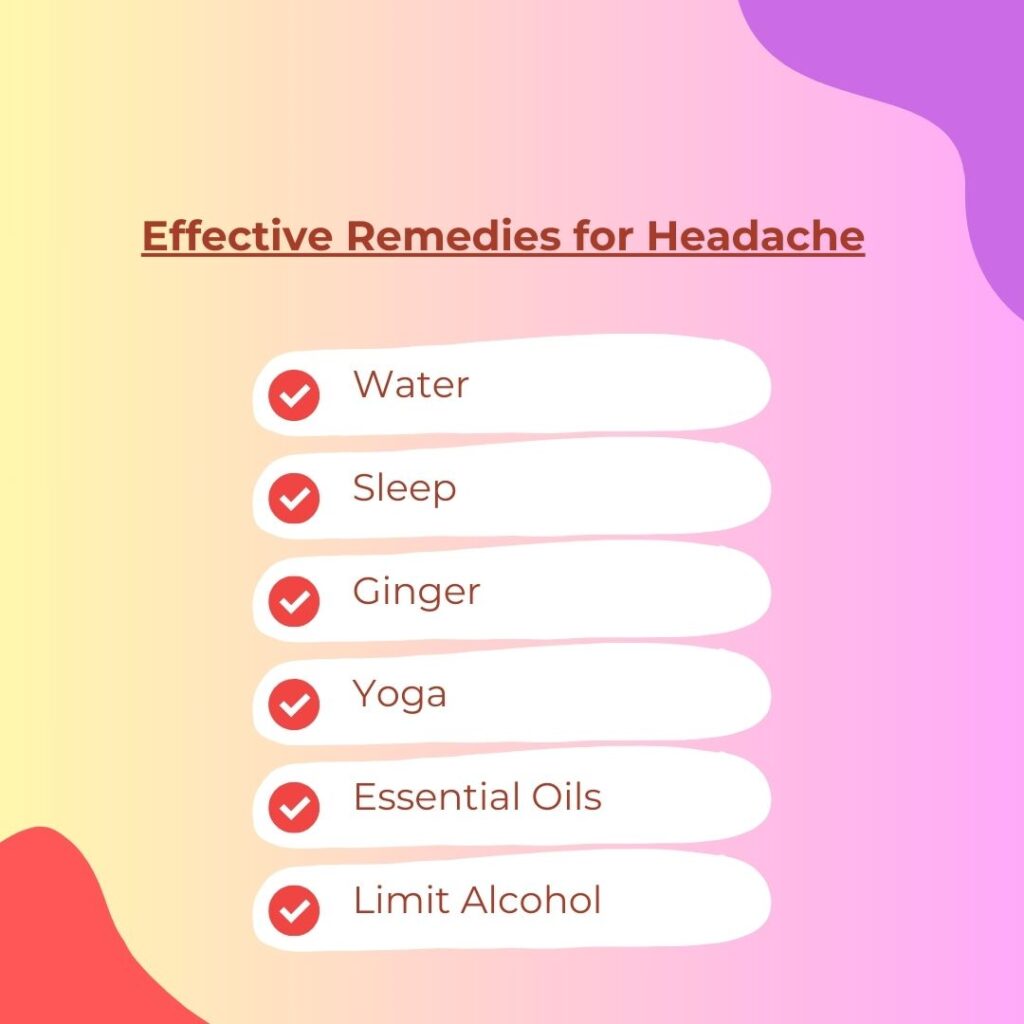Remedies to Get Rid of Headaches Naturally
Headaches are a frequent ailment that can range from mildly bothersome to completely debilitating, interfering with daily living. While medicines are accessible, there are some natural cures that can help ease headache symptoms quickly. This article addresses natural cures, preventative tips, headache causes, when to seek medical attention, and frequently asked questions.
Causes of Headaches:
Headaches can be caused by a variety of events, ranging from small lifestyle changes to serious medical conditions:
Lifestyle factors: Lack of sleep, dehydration, caffeine withdrawal, alcohol consumption, vitamin deficiencies, and undereating are all common triggers.
Serious illnesses such as tumors, blood clots, traumatic brain injuries, and central nervous system infections can all result in headaches.
Other risk factors include obesity, smoking, sleep difficulties, excessive coffee consumption, and a family history of headaches.

Natural Remedies for Headaches
1. Drink Water
Dehydration is a common cause of headaches. According to studies, staying hydrated can help you avoid and treat headaches.
Tip: Add water-rich meals like fruits and vegetables to your diet.
2. Take Magnesium
Magnesium deficit is associated with migraines. Taking 600 mg of magnesium citrate per day may lower the frequency and severity of migraines.
Note: Start with fewer doses to minimize digestive problems such as diarrhea.
3. Limit Alcohol
In certain people, alcohol can cause dehydration and vascular abnormalities, resulting in migraines and other severe headaches.
4. Get Adequate Sleep
Both too much and too little sleep might result in headaches. Aim for 7-9 hours of quality sleep per night.
5. Avoid Histamine-Rich Foods
Histamine, found in aged cheeses, fermented meals, and cured meats, can cause migraines in sensitive people.
6. Use Essential Oils
Peppermint and lavender essential oils can help relieve headaches. Apply diluted essential oil on your temples and wrists, or diffuse it.
7. Try a B-Complex Vitamin
B vitamins (B2, B12, and B6) may help prevent headaches. B-complex pills supply all of the important B vitamins and are safe to take on a regular basis.
8. Apply a Cold Compress
A cold compress can reduce inflammation, impede nerve conduction, and constrict blood vessels, so relieving headache discomfort.
9. Follow an Elimination Diet
To lessen the frequency of headaches, identify and avoid food triggers such as aged cheese, alcohol, chocolate, citrus fruits and coffee.
10. Drink Caffeinated Tea or Coffee
Caffeine can constrict blood vessels, increasing the effectiveness of headache medicines. If you eat too much, you may have withdrawal symptoms.
11. Try Acupuncture
This traditional Chinese technique, which includes putting small needles into the skin, has been demonstrated to lessen migraine frequency and intensity.
12. Practice Yoga
Yoga can help to reduce the intensity and frequency of headaches by lowering stress and boosting circulation.
13. Avoid Strong Smells
Perfumes, cigarette smoke, and cleaning products can cause headaches in sensitive people.
14. Use Herbal Remedies
Herbs such as curcumin and chamomile have shown promise in treating headache symptoms. Before using any medication, always consult with a healthcare practitioner.
15. Take Ginger
Ginger includes anti-inflammatory chemicals that may alleviate headache severity and nausea. Fresh ginger tea is a simple yet effective cure.
16. Increase Physical Activity
Exercise can greatly lessen the frequency and severity of headaches. Begin with easy activities such as walking to promote daily activity.
Tips for Preventing Headaches
Stay Hydrated: Drink water at regular intervals throughout the day.
discover causes: Keep a headache diary to discover possible causes.
Eat regularly to avoid hunger-related headaches.
Get Proper Sleep: Maintain a consistent sleep schedule, aiming for 7-9 hours per night.
Manage stress: Include stress-relieving hobbies such as meditation, yoga, and journaling in your daily routine.
When to See a Doctor
While moderate, occasional headaches are frequently managed at home, seek medical treatment if you notice:
- Headaches that are severe and come on suddenly.
- Headaches occur after an injury or stress.
- Frequent or severe headaches that impede with daily activities.
- Frequent or severe headaches that impede with daily activities.
- Symptoms include disorientation, weakness, and visual abnormalities.
A healthcare provider can rule out significant illnesses, evaluate nutrient deficits, and suggest appropriate therapies.
Frequently Asked Questions
What is the fastest home remedy for a headache?
Drinking water, applying a cold compress, and using essential oils like peppermint or lavender often provide quick relief.
Are there any home remedies for headaches to avoid?
Avoid unverified remedies or excessive use of herbal supplements without consulting a healthcare provider, as they may interact with medications or cause side effects.
What makes headaches worse?
Triggers like dehydration, stress, excessive caffeine, or skipping meals can worsen headaches.
Headaches can be upsetting, but there are natural therapies and preventive practices that can help relieve and manage symptoms efficiently. These cures provide safe and accessible solutions, like drinking water, doing yoga, and detecting dietary factors. However, if your headaches are chronic or severe, visit a healthcare professional for an appropriate diagnosis and treatment.